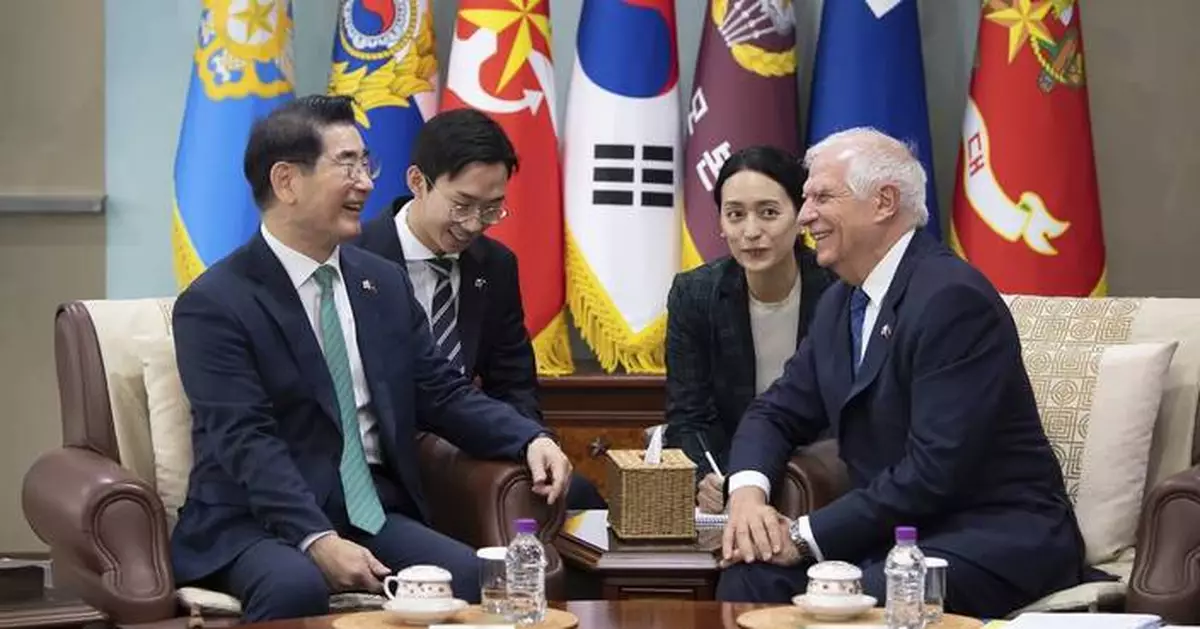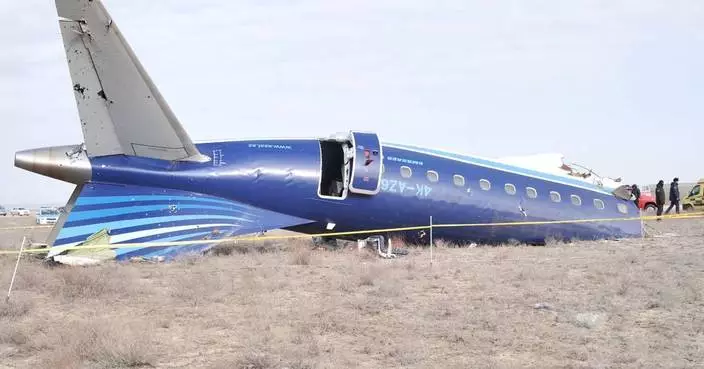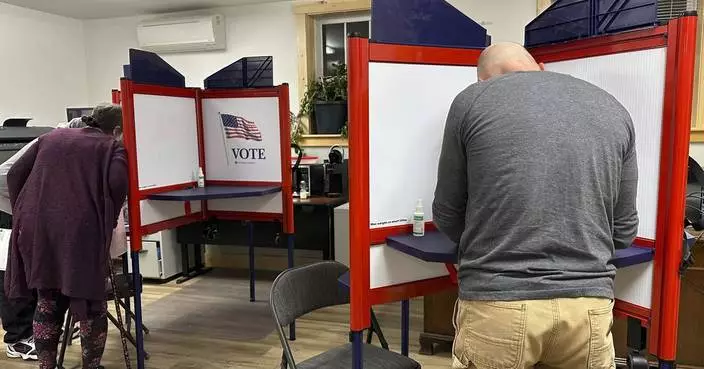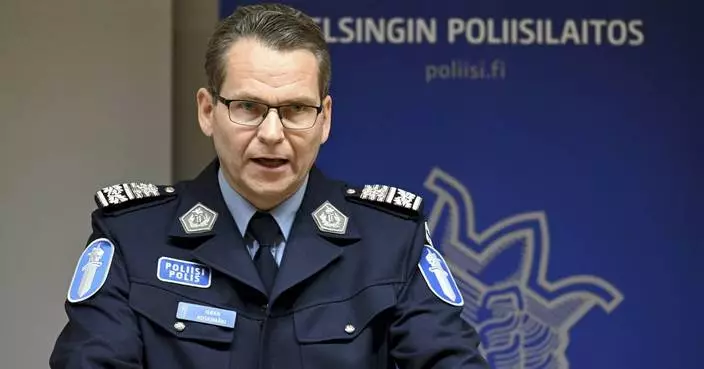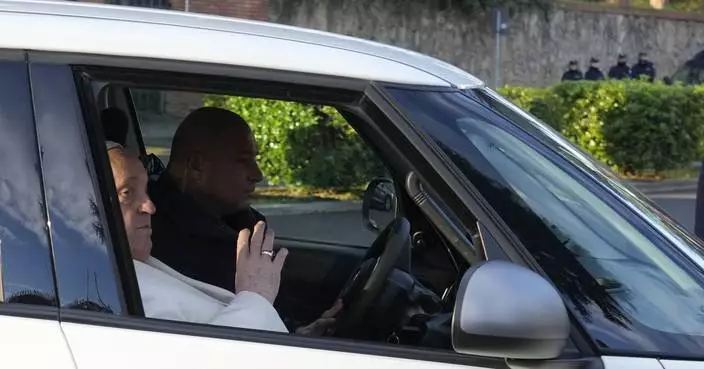SEOUL, South Korea (AP) — South Korea and the European Union on Monday strongly condemned North Korea’s reported dispatch of troops to aid Russia’s war against Ukraine and expressed concerns that Russia could reward North Korea with transfers of sensitive technology to enhance its nuclear and missile programs.
North Korea’s troop deployment, confirmed by the U.S. and NATO, threatens to expand the almost 3-year-long war and is causing security jitters in South Korea and elsewhere about what Russia could give North Korea in return.
Click to Gallery
In this photo provided by South Korea Defense Ministry, South Korean Defense Minister Kim Yong Hyun, left, and European Union foreign policy chief Josep Borrell, right, pose for a photo at the Defense Ministry, in Seoul, South Korea, Monday, Nov. 4, 2024. (South Korea Defense Ministry via AP)
In this photo provided by South Korea Defense Ministry, South Korean Defense Minister Kim Yong Hyun, left, talks with European Union foreign policy chief Josep Borrell, right, during a meeting at the Defense Ministry, in Seoul, South Korea, Monday, Nov. 4, 2024. (South Korea Defense Ministry via AP)
European Union foreign policy chief Josep Borrell, right, talks with South Korean Foreign Minister Cho Tae-yul (not in picture) during a meeting at the Foreign Ministry, in Seoul, South Korea, Monday, Nov. 4, 2024. ( Chung Sung-Jun/Pool Photo via AP)
South Korean Foreign Minister Cho Tae-yul, left, and European Union foreign policy chief Josep Borrell, right, during a meeting at the Foreign Ministry, in Seoul, South Korea, Monday, Nov. 4, 2024. ( Chung Sung-Jun/Pool Photo via AP)
South Korean Foreign Minister Cho Tae-yul, talks to European Union foreign policy chief Josep Borrell, not in picture, during a meeting at the Foreign Ministry, in Seoul, South Korea, Monday, Nov. 4, 2024. ( Chung Sung-Jun/Pool Photo via AP)
European Union foreign policy chief Josep Borrell, left, talks with South Korean Foreign Minister Cho Tae-yul, back to camera, during a meeting at the Foreign Ministry, in Seoul, South Korea, Monday, Nov. 4, 2024. ( Chung Sung-Jun/Pool Photo via AP)
South Korean Foreign Minister Cho Tae-yul, left and European Union foreign policy chief Josep Borrell, arrive for their meeting at the Foreign Ministry, in Seoul, South Korea, Monday, Nov. 4, 2024. ( Chung Sung-Jun/Pool Photo via AP)
South Korean Foreign Minister Cho Tae-yul, right, shakes hands with European Union foreign policy chief Josep Borrell, at the Foreign Ministry, in Seoul, South Korea, Monday, Nov. 4, 2024. ( Chung Sung-Jun/Pool Photo via AP)
In this photo provided by South Korea Defense Ministry, South Korean Defense Minister Kim Yong Hyun, left, and European Union foreign policy chief Josep Borrell, right, pose for a photo at the Defense Ministry, in Seoul, South Korea, Monday, Nov. 4, 2024. (South Korea Defense Ministry via AP)
In this photo provided by South Korea Defense Ministry, South Korean Defense Minister Kim Yong Hyun, left, talks with European Union foreign policy chief Josep Borrell, right, during a meeting at the Defense Ministry, in Seoul, South Korea, Monday, Nov. 4, 2024. (South Korea Defense Ministry via AP)
After a meeting in Seoul, South Korean Foreign Minister Cho Tae-yul and EU foreign policy chief Josep Borrell issued a joint statement condemning in the “strongest possible terms” North Korea’s deployment and voicing worries about Russia's possible provision of materials and technology to North Korea in support of its military objectives.
“We are also deeply concerned about the possibility for any transfer of nuclear- or ballistic missile-related technology to the DPRK, which would jeopardize the international non-proliferation efforts and threaten peace and stability on the Korean Peninsula and across the globe,” the statement said. DPRK stands for the Democratic People’s Republic of Korea, North Korea’s official name.
Cho and Borrell called North Korea's deployment a “flagrant” violation of multiple U.N. Security Council resolutions and called on North Korea and Russia to immediately withdraw the troops from Russia.
Also on Monday, in Moscow, Russian President Vladimir Putin met North Korean Foreign Minister Choe Son Hui, who has been on an official visit to Russia since late last week. State television showed them greeting each other, but details of the meeting were not available.
Earlier Monday, Borrell met South Korean Defense Minister Kim Yong Hyun and they agreed to work together with the international community to try to obstruct Russian-North Korean security cooperation, according to the South Korean Defense Ministry.
North Korea and Russia haven’t explicitly confirmed the North Korean deployment. But they’ve both argued that their military cooperation conforms with international laws.
U.S. State Department spokesman Matthew Miller told reporters Monday that as many as 10,000 North Korean soldiers were in Russia’s Kursk region near Ukraine’s border and preparing to join Moscow’s fight against Ukraine in the coming days. That’s up from the 8,000 troops that the U.S. government mentioned Thursday.
Ukraine’s President Volodymyr Zelenskyy urged allies to stop just “watching” and take steps before North Korean troops deployed in Russia reach the battlefield.
According to U.S., South Korean and Ukrainian intelligence assessments, North Korea was estimated to have moved a total of about 10,000 to 12,000 troops to Russia. If they start fighting against Ukraine forces, it would mark North Korea’s first participation in a large-scale conflict since the end of the 1950-53 Korean War.
North Korean leader Kim Jong Un has used the Russia-Ukraine war as a way to expand defense and economic cooperation with Russia in the face of an intensifying U.S.-led pressure campaign against his advancing nuclear program. The U.S., South Korea and others accuse North Korea of having already exported artillery shells, missiles and other conventional arms to Russia.
Besides Russia's possible weapons technology transfer, South Korean officials also worry that Moscow might offer defense commitment to North Korea in the event of a war on the Korean Peninsula. The North Korean troops in Russia could also learn valuable combat experience and get Russian help to modernize their outdated conventional weapons systems.
In the past two years, Kim has ramped up tests of nuclear-capable missile systems, as Russia and China have repeatedly blocked U.S.-led attempts to toughen international sanctions on North Korea over its testing activities in defiance of U.N. bans. Last week, North Korea test-launched an intercontinental ballistic missile designed to attack the U.S. mainland for the first time in almost a year.
North Korea has also pushed to sever relations and abandon its long-standing goal of reconciliation with South Korea.
In a background briefing with local media Monday, South Korea’s military said North Korea has built anti-tank, trench-like structures at two sites near the Koreas’ heavily armed border, where it blew up northern parts of unused cross-border road and rail routes last month in a display of anger toward South Korea.
In a war situation, the North could easily fill up the trenches with piles of dirt nearby to create routes to invade the South, according to the Joint Chiefs of Staff.
Details of the briefing were shared with The Associated Press.
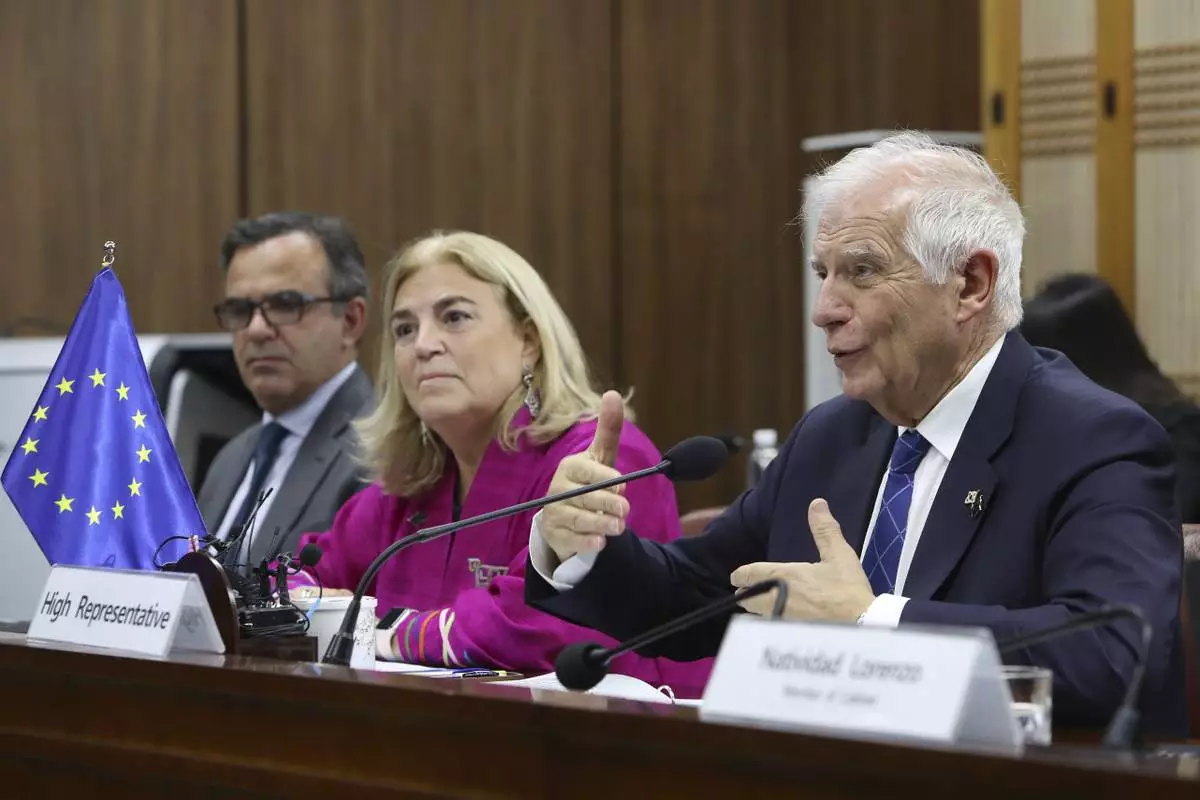
European Union foreign policy chief Josep Borrell, right, talks with South Korean Foreign Minister Cho Tae-yul (not in picture) during a meeting at the Foreign Ministry, in Seoul, South Korea, Monday, Nov. 4, 2024. ( Chung Sung-Jun/Pool Photo via AP)
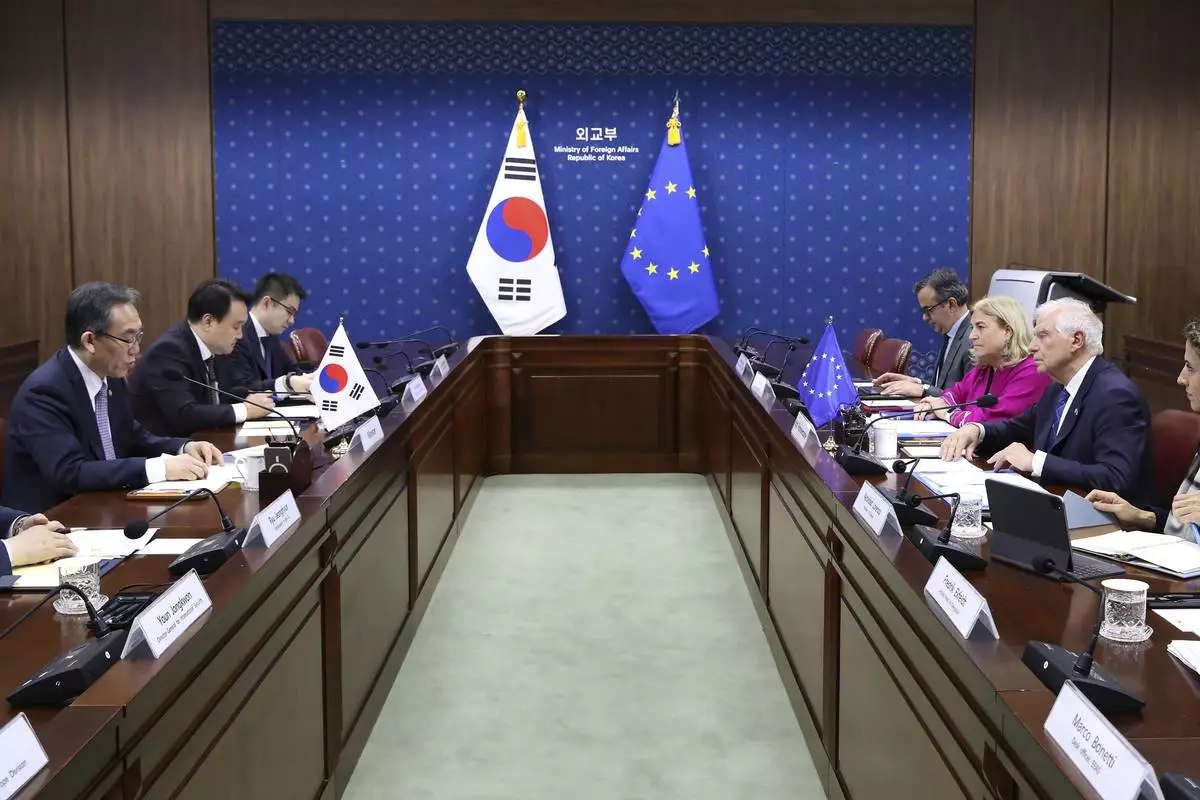
South Korean Foreign Minister Cho Tae-yul, left, and European Union foreign policy chief Josep Borrell, right, during a meeting at the Foreign Ministry, in Seoul, South Korea, Monday, Nov. 4, 2024. ( Chung Sung-Jun/Pool Photo via AP)
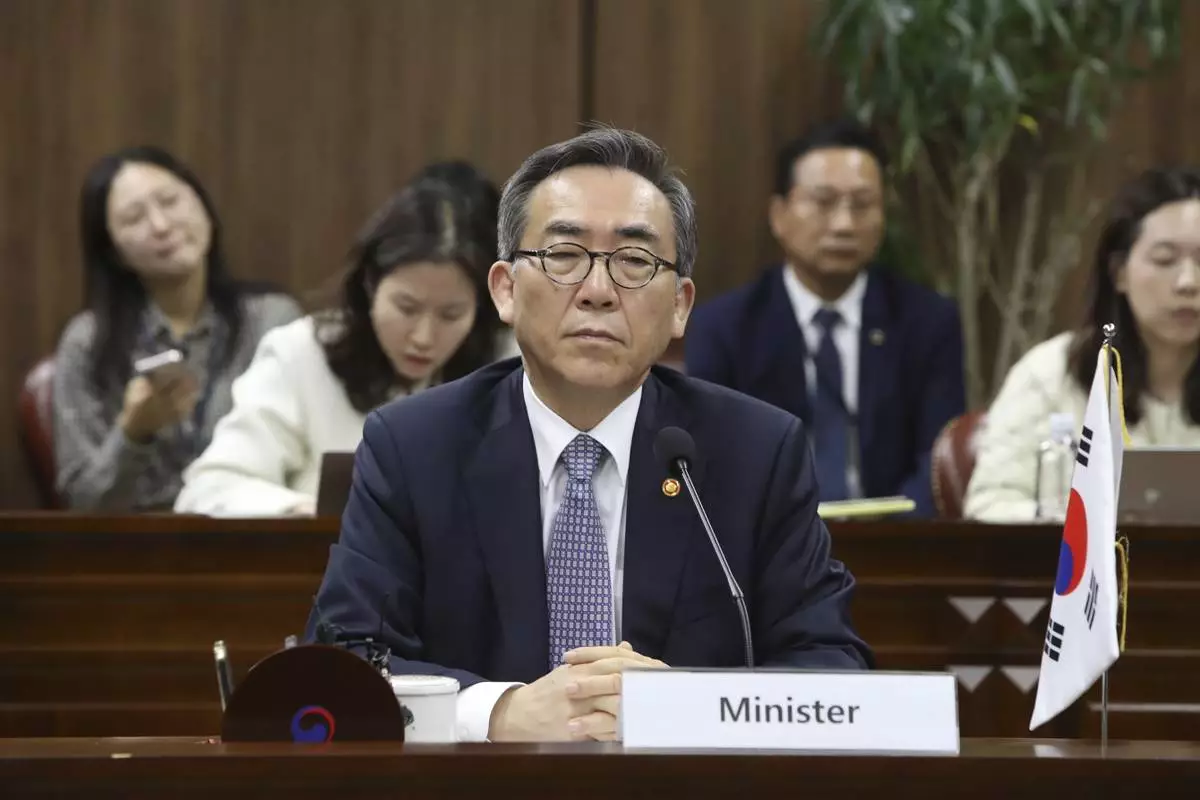
South Korean Foreign Minister Cho Tae-yul, talks to European Union foreign policy chief Josep Borrell, not in picture, during a meeting at the Foreign Ministry, in Seoul, South Korea, Monday, Nov. 4, 2024. ( Chung Sung-Jun/Pool Photo via AP)
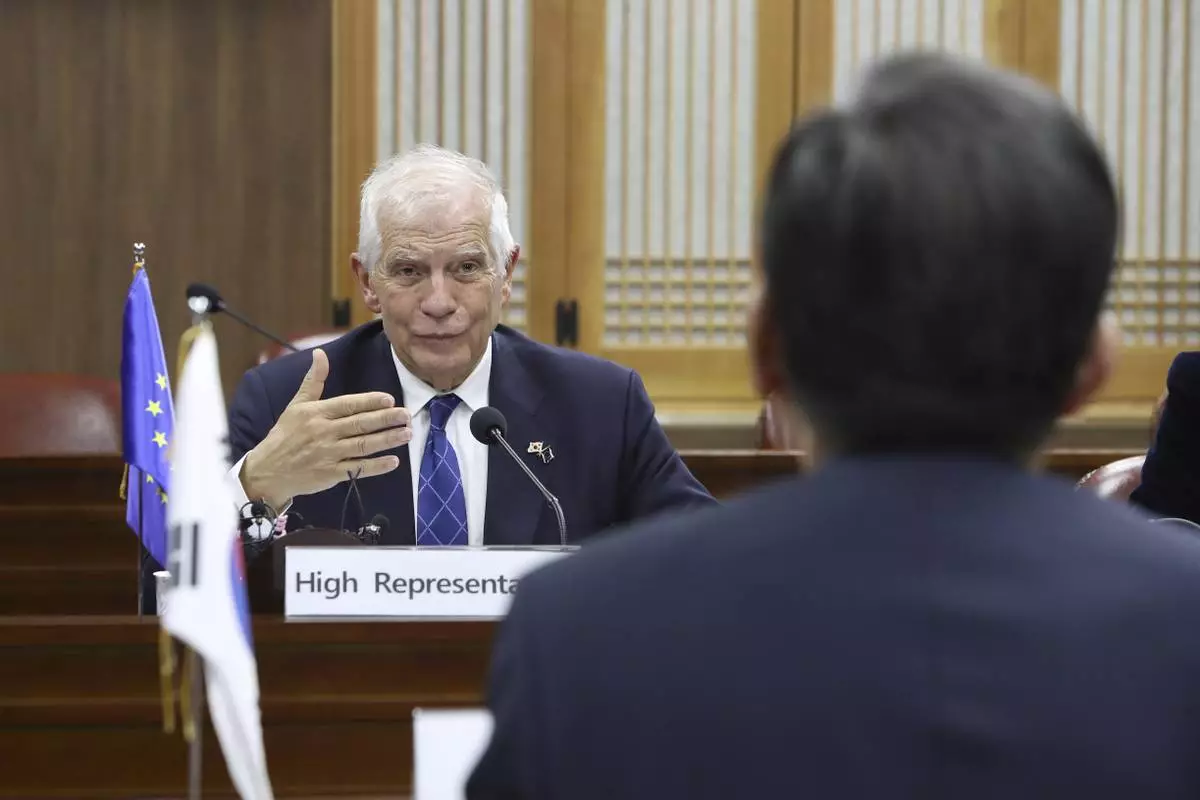
European Union foreign policy chief Josep Borrell, left, talks with South Korean Foreign Minister Cho Tae-yul, back to camera, during a meeting at the Foreign Ministry, in Seoul, South Korea, Monday, Nov. 4, 2024. ( Chung Sung-Jun/Pool Photo via AP)
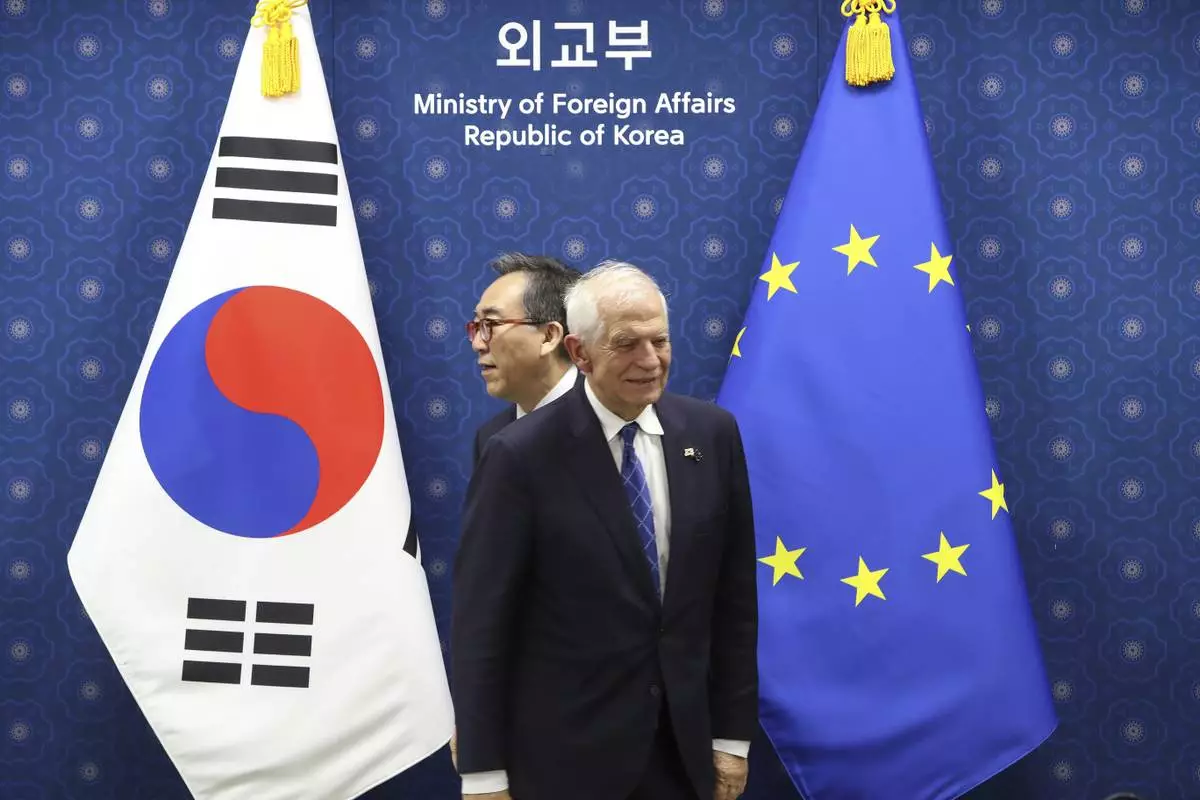
South Korean Foreign Minister Cho Tae-yul, left and European Union foreign policy chief Josep Borrell, arrive for their meeting at the Foreign Ministry, in Seoul, South Korea, Monday, Nov. 4, 2024. ( Chung Sung-Jun/Pool Photo via AP)
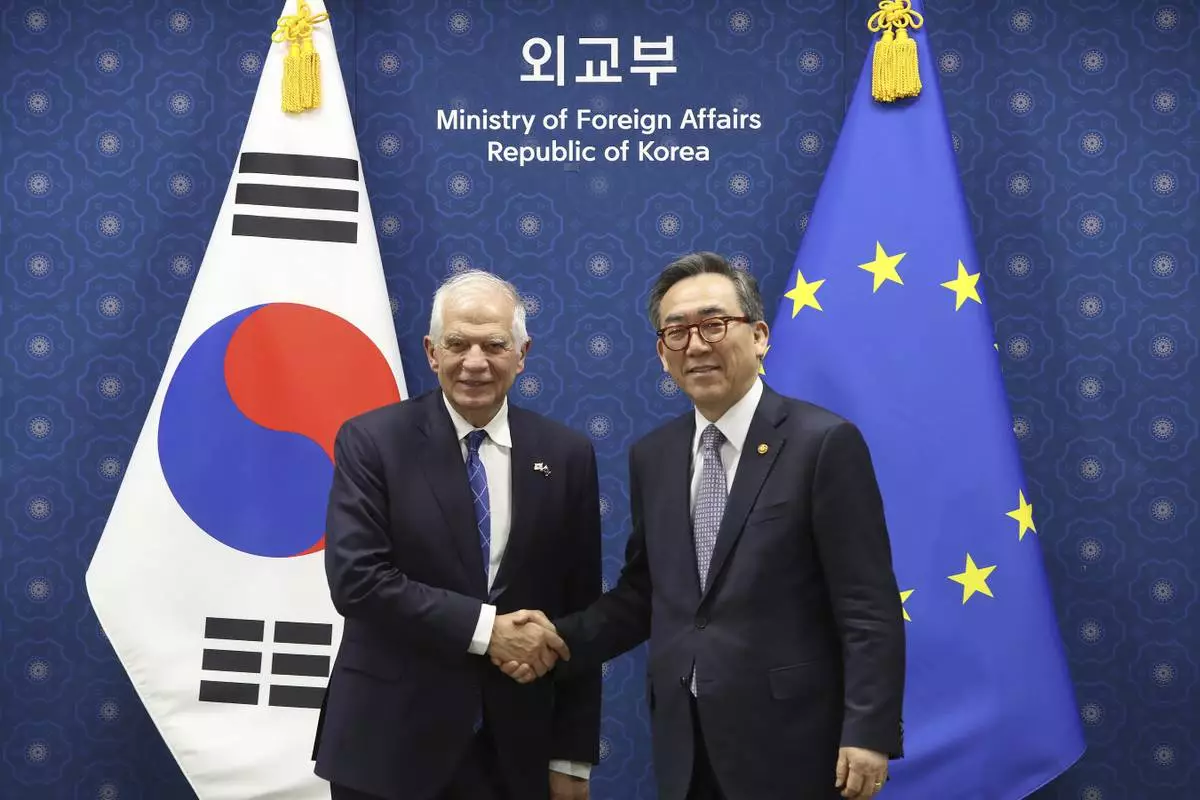
South Korean Foreign Minister Cho Tae-yul, right, shakes hands with European Union foreign policy chief Josep Borrell, at the Foreign Ministry, in Seoul, South Korea, Monday, Nov. 4, 2024. ( Chung Sung-Jun/Pool Photo via AP)
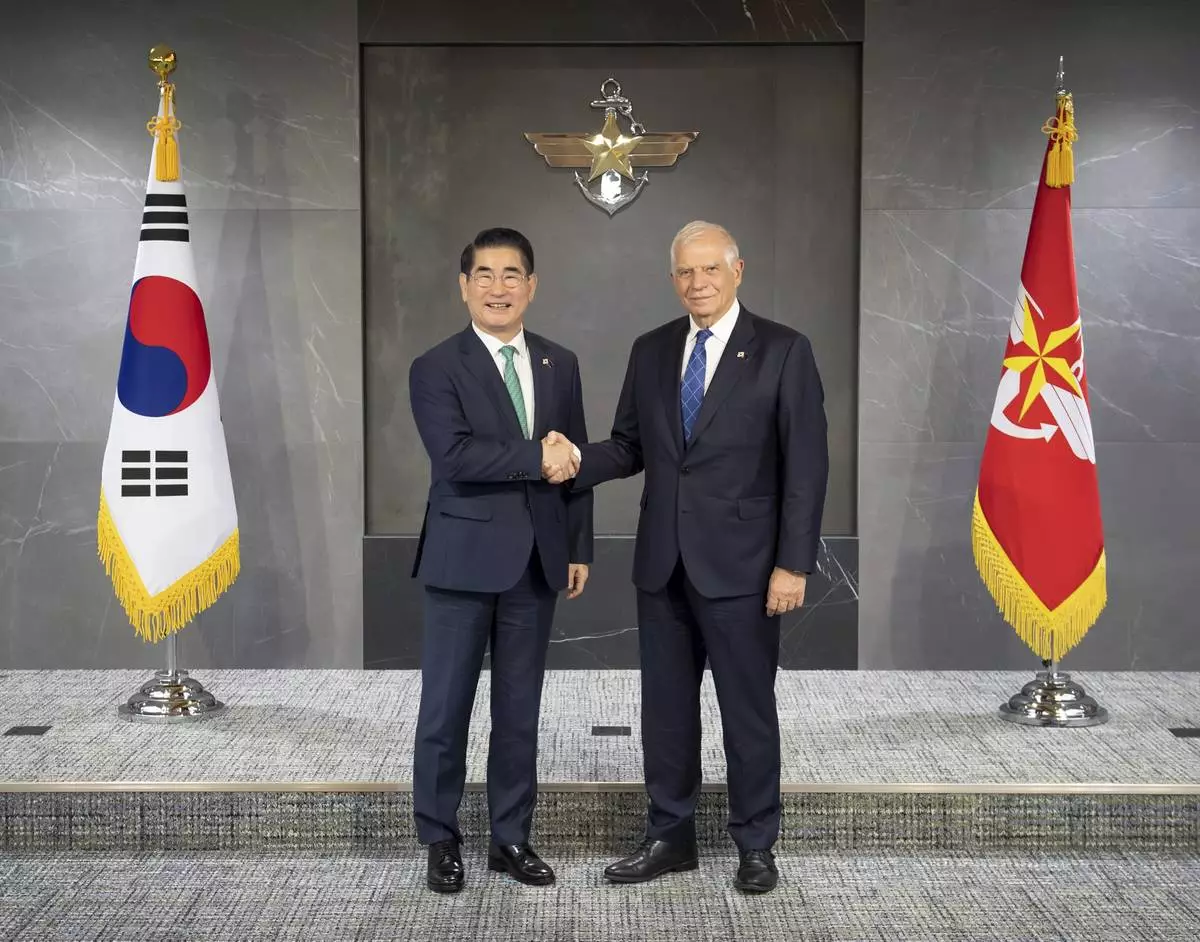
In this photo provided by South Korea Defense Ministry, South Korean Defense Minister Kim Yong Hyun, left, and European Union foreign policy chief Josep Borrell, right, pose for a photo at the Defense Ministry, in Seoul, South Korea, Monday, Nov. 4, 2024. (South Korea Defense Ministry via AP)
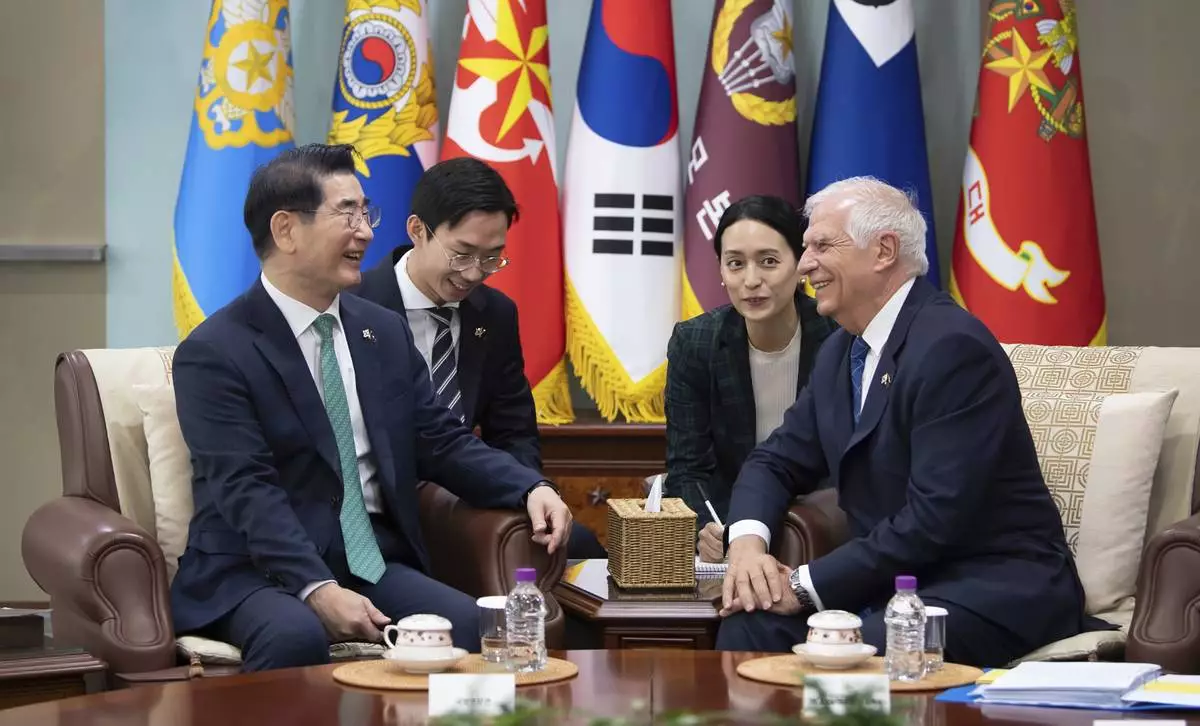
In this photo provided by South Korea Defense Ministry, South Korean Defense Minister Kim Yong Hyun, left, talks with European Union foreign policy chief Josep Borrell, right, during a meeting at the Defense Ministry, in Seoul, South Korea, Monday, Nov. 4, 2024. (South Korea Defense Ministry via AP)
U.S. markets are broadly lower before the opening bell in what's expected to be thin holiday trading.
Futures for the S&P 500 and the Dow Jones Industrial Average slipped 0.4% in the early hours Thursday. Markets were closed Wednesday for the Christmas holiday.
The government's weekly update on U.S. unemployment benefit applications will get some attention.
While it did little to boost Netflix's stock, the streaming giant was the talk of Christmas with its broadcast of back-to-back NFL matchups on Christmas, highlighted by Beyoncé's nearly 13-minute performance at halftime of the Houston Texans 31-2 loss to the Baltimore Ravens.
Unlike some of its other recent live events, Netflix's broadcast went off glitch-free, becoming the second-most popular live title ever for streaming service, according to NFL Media.
U.S. markets have historically gotten a boost at year's end, despite usually lower trading volumes. The last five trading days of each year, plus the first two in the new year, have brought an average gain of 1.3% since 1950.
So far this month, the U.S. stock market has lost some of its gains since President-elect Donald Trump’s win on Election Day, which raised hopes for faster economic growth and more lax regulations that would boost corporate profits. Worries have risen that Trump’s preference for tariffs and other policies could lead to higher inflation, a bigger U.S. government debt and difficulties for global trade.
Even so, the U.S. market remains on pace to deliver strong returns for 2024. The benchmark S&P 500 is up 26.6% so far this year and remains within roughly 1% of the all-time high it set earlier this month — its latest of 57 record highs this year.
Japan's Nikkei 225 index surged 1.1% to 39,568.06, on strong gains in retailers and tourism-related stocks after Japan agreed to ease visa conditions for Chinese tourists.
Isetan Mitsukoshi Holdings, a major department store group, gained 7.7%. J. Front Retailing Co., owner of the Matsuzakaya and Daimaru department store groups, jumped 8.3%. Automakers also saw large gains.
China and Japan also agreed Wednesday to conduct talks on contentious security issues and other sources of friction during a visit by Japanese Foreign Minister Takeshi Iwaya to Beijing, where he met with Chinese Premier Li Qiang and Foreign Minister Wang Yi.
South Korea's Kospi slipped 0.4% to 2,429.67, while the Taiex in Taiwan gained 0.1%.
The Shanghai Composite index edged 0.1% higher, to 3,398.08.
Thailand's SET fell 0.1%.
Major European markets are closed Thursday, as well as Hong Kong, Australia, New Zealand and Indonesia.
U.S. benchmark crude oil rose 40 cents to $70.50 per barrel. Brent crude, the international standard, picked up 36 cents to $73.53 per barrel.
The dollar rose to 157.65 Japanese yen from 157.19 yen. The euro fell to $1.0398 from $1.0410.

FIL:E - The New York Stock Exchange is shown in New York's Financial District on Dec. 23, 2024. (AP Photo/Peter Morgan, File)

FIL:E - People photograph the New York Stock Exchange in New York's Financial District on Dec. 23, 2024. (AP Photo/Peter Morgan, File)

Lights marking the entrance to a subway station frame the New York Stock Exchange in New York's Financial District on Monday, Dec. 23, 2024. (AP Photo/Peter Morgan)
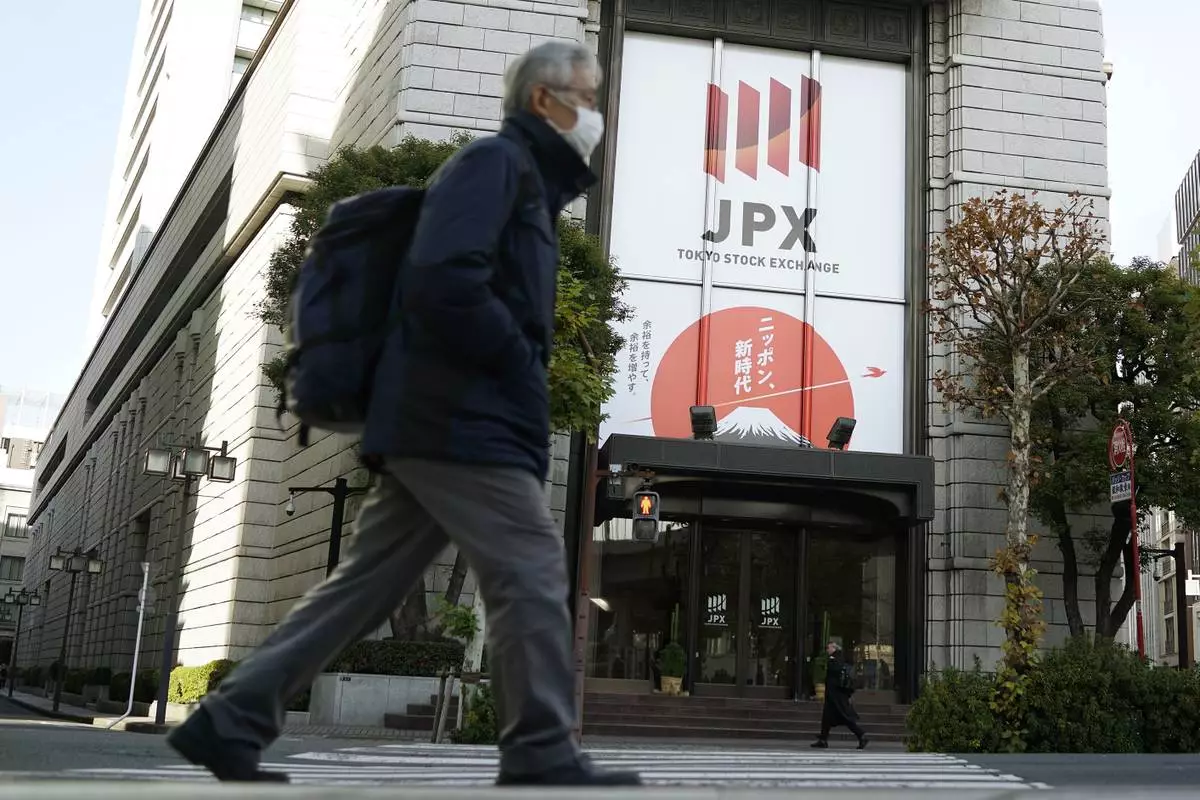
People walk in front of Tokyo Stock Exchange building Wednesday, Dec. 25, 2024, in Tokyo. (AP Photo/Eugene Hoshiko)

Currency traders watch monitors near a screen showing the Korea Composite Stock Price Index (KOSPI), top left, and the foreign exchange rate between the U.S. dollar and the South Korean won, top center, at the foreign exchange dealing room of the KEB Hana Bank headquarters in Seoul, South Korea, Thursday, Dec. 26, 2024. (AP Photo/Ahn Young-joon)

Currency traders work at the foreign exchange dealing room of the KEB Hana Bank headquarters in Seoul, South Korea, Thursday, Dec. 26, 2024. (AP Photo/Ahn Young-joon)

A currency trader talks to another near a screen showing the Korea Composite Stock Price Index (KOSPI), top left, and the foreign exchange rate between U.S. dollar and South Korean won, top center, at the foreign exchange dealing room of the KEB Hana Bank headquarters in Seoul, South Korea, Thursday, Dec. 26, 2024. (AP Photo/Ahn Young-joon)

A currency trader watches monitors near a screen showing the Korea Composite Stock Price Index (KOSPI), left, and the foreign exchange rate between the U.S. dollar and the South Korean won at the foreign exchange dealing room of the KEB Hana Bank headquarters in Seoul, South Korea, Thursday, Dec. 26, 2024. (AP Photo/Ahn Young-joon)










